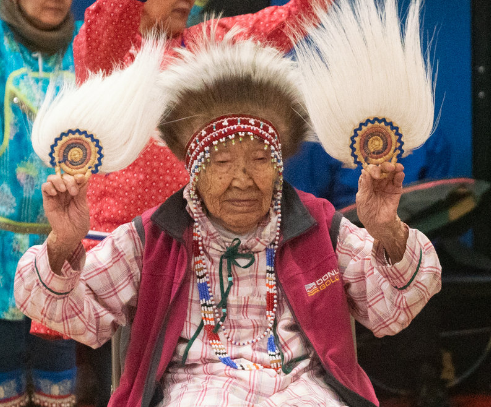
- Details
- By Levi Rickert
TOKSOOK BAY, Alaska — One day after celebrating her 90th birthday, Lizzie Chimiugak became the first American citizen to formally be counted in the 2020 Census on Tuesday.
Chimiugak, an Alaska Native was counted at her home in Toksook Bay, a remote Alaska Native village, was chosen by the Census Bureau as the first place in the United States to begin the official count that is mandated by the U.S. Constitution to occur every 10 years.
Census statistics are used to determine the number of seats each state holds in the U.S. House of Representatives and inform how billions of dollars in federal funds will be allocated by state, local, and federal lawmakers every year for the next 10 years.
After being counted, Chimiugak participated in a Native village dance ceremony. Villagers listened to a program that included the importance of being counted in the 2020 Census and to discuss climate change, another issue impacting Native Alaskan lives.

Toksook Bay is a village located on Nelson Island along the Bering Sea in southwestern Alaska. Census takers must get a head start in rural, remote areas like Toksook Bay when the ground is frozen and prior to the spring thaw, when residents leave to fish, hunt and seek out warm-weather jobs.
More than half of households on tribal lands across the country have nontraditional addresses where the Census Bureau can’t mail a census form. With no at-home mail delivery and a short window to respond before seasons change, receiving an invitation this way would be nearly impossible for remote Alaska residents.
That is why the Census Bureau worked with Alaska Native leaders to determine the best way to count people living on their lands. In Toksook Bay and other remote areas of Alaska, census takers will visit people at home and will fill out their questionnaires in person.
More Stories Like This
Native News Weekly (August 25, 2024): D.C. BriefsHaaland Gets First Hand Look at Efforts to Address Homelessness in Albuquerque
Navajo Nation Secures $285 Million in Federal Broadband Funding to Connect Thousands of Homes
Oral History Project Announces 18th Stop in Denver, Colorado: NABS Continues Preserving Critical Stories Across Indian Countr
Next on Native Bidaské: Protecting Legacy Before It’s Forgotten with the National Native American Hall of Fame
Help us defend tribal sovereignty.
At Native News Online, our mission is rooted in telling the stories that strengthen sovereignty and uplift Indigenous voices — not just at year’s end, but every single day.
Because of your generosity last year, we were able to keep our reporters on the ground in tribal communities, at national gatherings and in the halls of Congress — covering the issues that matter most to Indian Country: sovereignty, culture, education, health and economic opportunity.
That support sustained us through a tough year in 2025. Now, as we look to the year ahead, we need your help right now to ensure warrior journalism remains strong — reporting that defends tribal sovereignty, amplifies Native truth, and holds power accountable.
 The stakes couldn't be higher. Your support keeps Native voices heard, Native stories told and Native sovereignty defended.
The stakes couldn't be higher. Your support keeps Native voices heard, Native stories told and Native sovereignty defended.
Stand with Warrior Journalism today.
Levi Rickert (Potawatomi), Editor & Publisher

